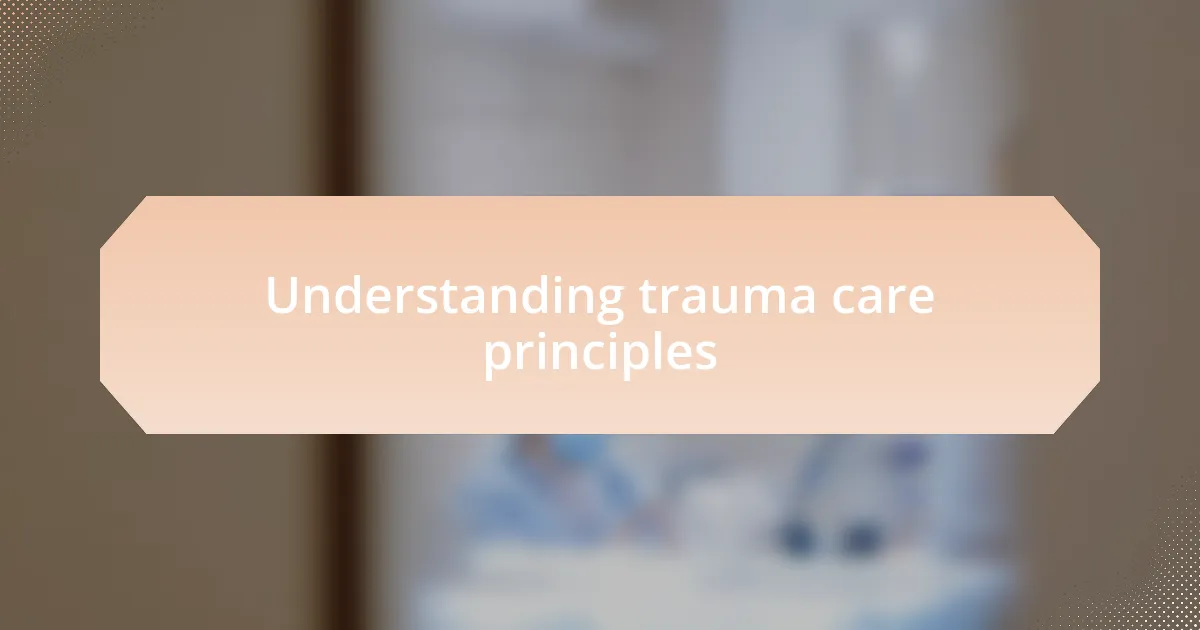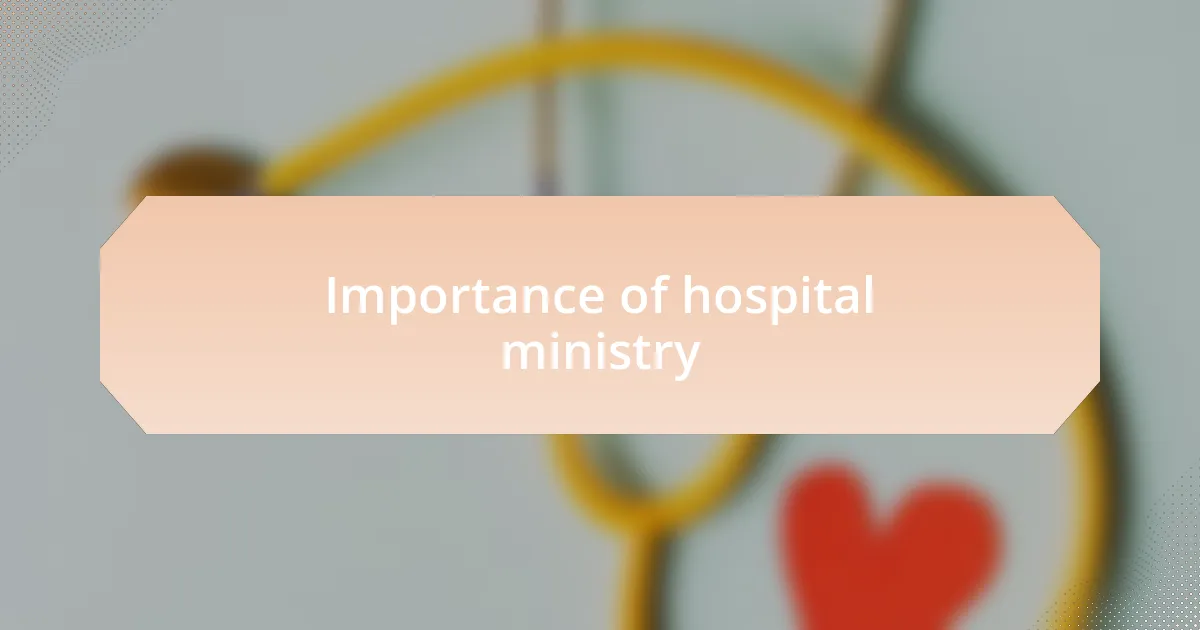Key takeaways:
- The “golden hour” emphasizes the critical importance of timely treatment in trauma care, significantly increasing survival rates.
- Hospital ministry provides essential emotional and spiritual support, fostering hope and connection for patients and families in crisis.
- Chaplains play a vital role by offering compassion, facilitating conversations, and engaging in rituals that promote healing.
- Emotional support is crucial not only for patients but also for their families, enhancing the overall recovery process and the morale of the care team.

Understanding trauma care principles
Trauma care principles revolve around the immediate and effective response to critical injuries, emphasizing the importance of stabilizing the patient first. I remember my first encounter in trauma care—watching a team come together in a rush, each member knowing their role as if it were instinctual. It made me realize how crucial preparedness is in those moments; the chaos can easily turn overwhelming if not harnessed by trained hands.
In my experience, one key principle is the “golden hour” concept. This refers to the critical first hour after an injury, when timely treatment dramatically increases survival rates. Reflecting on a particular case, I stood by a young man’s bedside, feeling the weight of hope and urgency in the air. How often do we really appreciate what can be done in such a short span of time?
Another essential principle is the significance of a multi-disciplinary approach. Each member of the trauma team—surgeons, nurses, and even mental health professionals—plays a vital role in healing. I’ve seen firsthand how a compassionate word from a nurse can comfort a frightened patient, easing anxiety in a situation that feels anything but controllable. It leaves me wondering, how powerful can our connections be in the midst of crisis?

Importance of hospital ministry
Hospital ministry plays a crucial role in providing emotional and spiritual support to patients and families facing the realities of illness and trauma. I recall a day when I sat with a family waiting for news about their loved one in surgery. The anxiety in the room was palpable, but I saw how a simple prayer brought a moment of peace amidst the uncertainty. It made me appreciate how essential it is to offer not just medical care, but also a listening ear and a comforting presence.
Another important aspect of hospital ministry is fostering hope. I’ve witnessed how a hospital chaplain’s visit can uplift a struggling patient, reminding them that they are not alone in their fight. In one instance, I watched an elderly man’s face light up when someone took the time to share a story of resilience. Isn’t it amazing how hope can be rekindled even in the darkest of times?
Moreover, hospital ministry serves as a bridge between medical treatment and holistic care. During my time in a trauma unit, I found that addressing spiritual needs often accelerated the healing process. A nurse shared with me how patients who engaged in spiritual conversations seemed to cope better with pain. Could it be that our emotional and spiritual health is intrinsically linked to our physical well-being?

Role of hospital chaplains
In the hospital setting, chaplains serve as essential companions to both patients and families during some of the most challenging moments of their lives. I remember standing by a bedside when a fellow chaplain gently held a patient’s hand, offering comfort as they navigated their fears around a difficult diagnosis. This simple act highlighted how chaplains truly embody compassion, creating a safe space where emotions can be expressed without judgment or fear.
Beyond offering presence, chaplains often facilitate crucial conversations that can lead to meaningful healing. I once sat in on a family meeting where the chaplain helped bridge gaps in understanding between the medical team and the loved ones of a patient in critical condition. Their skillful guidance allowed family members to voice their concerns, promoting an atmosphere of clarity and support. Doesn’t it seem that having someone skilled in navigating emotions can change the trajectory of a family’s journey through illness?
Chaplains also engage in ritual and tradition, which can be profoundly comforting during times of crisis. Whether it’s lighting a candle, reading scripture, or offering blessings, these practices can provide strength and hope. I’ve seen how a simple ritual can transform the atmosphere in a waiting room, reminding everyone present of the resilience of the human spirit. Isn’t it powerful to think that these small moments can foster connection and bring solace during such uncertain times?

Emotional support in trauma care
Emotional support plays a crucial role in trauma care, often acting as a balm for the wounded spirit. I remember a night shift when a mother received heartbreaking news about her child’s condition. In that moment, I could see the despair in her eyes, and it sparked a deep empathy within me. Offering a listening ear and a comforting presence allowed her to release some of that overwhelming weight, even if just for a moment. How often do we underestimate the power of simply being there for someone in their darkest hour?
The importance of emotional support extends beyond just the patient; families often find themselves in turmoil, needing someone to validate their feelings. During one particularly intense family session, I saw a father struggling with anger and guilt. I took a moment to reflect on my own experiences of loss and shared a story of my journey through grief. Suddenly, the room shifted; it became a space where vulnerability was embraced instead of feared. Wouldn’t it be incredible if more healthcare providers recognized how sharing our humanity can foster healing connections?
Moreover, the impact of emotional support reverberates throughout the entire care team. I recall a day when a nurse shared with me how my interaction with a patient—a moment of genuine connection—transformed her approach to that individual. It was a reminder that when we focus on the emotional needs of those in our care, we not only support recovery but ignite passion in our colleagues. Isn’t that ripple effect incredibly inspiring?

Personal experiences in trauma care
I’ll never forget the day I encountered a young man who had just been in a severe car accident. His body was fragile, but the real challenge lay in his eyes—there was sheer panic and uncertainty about his fate. I pulled up a chair beside him, reminding myself that offering a gentle touch and steady voice could help ground him amidst the chaos. Have you ever felt that certain connection with someone during a crisis? I knew in that moment that being a calming presence made all the difference in his experience.
Another vivid memory springs to mind when I think of trauma care—a delicate interaction with a teenager who had suffered a fall during a routine soccer game. Initially, his bravado masked the deep fear he felt. I remember how I shared my own fears from childhood, recalling how I once faced a similar injury. This moment of shared vulnerability opened the floodgates, allowing him to express his worries and understand that he wasn’t alone in his struggle. How powerful it is when we can relate on a human level, breaking down barriers that fear erects!
Then there was the time I witnessed a surgeon, visibly exhausted yet determined, leaning over a patient while offering words of reassurance. In that tense atmosphere, he took a brief pause to reflect on his own experiences with trauma and healing, reminding both the patient and the staff that hope can be so vital. I realized that even in the most high-pressure environments, sharing personal experiences can resonate profoundly. Isn’t it fascinating how a simple story can bridge gaps and foster resilience in moments of distress?

Challenges faced in hospital ministry
In hospital ministry, one of the most significant challenges I’ve faced is the emotional toll of witnessing suffering on a daily basis. I vividly recall a night shift where I met a family grappling with the shock of their loved one’s diagnosis. It reminded me of my own family’s struggles, and I could feel the weight of their despair. How can we truly support others when our hearts are heavy too? Balancing personal emotions while providing the support they need became a delicate dance.
Another issue that often arises is navigating the diverse spiritual needs of patients and their families. I remember a moment when a patient requested a prayer from me while his family held completely different beliefs. This situation pushed me to reflect on how to honor each individual’s faith journey while still offering comfort. How can we be effective ministers if we fail to recognize the tapestry of beliefs surrounding us? I learned that being open, respectful, and adaptable can make a vital difference in these moments of intersection.
Finally, managing time effectively in a bustling hospital setting can sometimes feel overwhelming. On one occasion, I aimed to spend meaningful moments with each patient, yet the urgent demands of care pulled me in multiple directions. This led me to ponder—how do we prioritize spiritual care amidst the chaos? For me, I discovered that even brief moments of genuine connection—like a simple smile or listening ear—can create lasting impact, showing that even small acts of kindness can make a significant difference in someone’s journey.